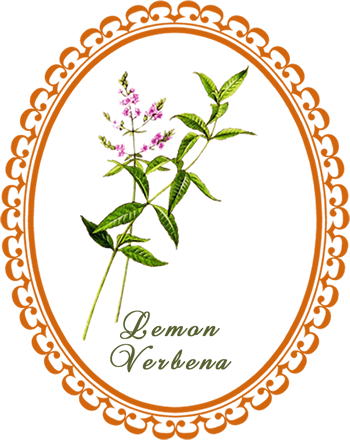
Lemon Verbena: one of the herbs that crosses the divide between food and medicine, it is most often used as a tea or tissane ...
Common Names: Lemon Verbena
Botanical Name: Aloysia triphylla
Family: Verbenaceae
Plant Type: Deciduous shrub
Parts Used: Leaves
Flowering: August
Lemon verbena is native to South America.
Description: The lemon verbena bush grows to a height of about 6 - 10 feet, has strong, lemon-scented green leaves and clusters of aromatic, small, white or purple flowers that have a tiny yellow dot in the centre. When touched, the flower releases a refreshing fragrance.
Cultivation: Lemon verbena is a shrub, hardy to zone 9. This shrub is native to Chile and Peru; elsewhere it is frequently grown as a houseplant.
Harvest: Leaves and flowering tops are gathered in August when the shrub is in flower.
Culinary Uses: Use in marinades, fish or poultry dishes, salad dressings, and puddings. Lemon verbena is most often used as a tea or tissane, either alone or with other pleasant-tasting herbs.
Lemon Verbena Magick
Purification. Love.
Gender: Masculine
Planet: Mercury
Element: Air
Use lemon verbena in a purifying bath.
Place a leaf under your pillow at night to prevent dreaming.
Use lemon verbena in love spells, and add it to other spells to strengthen them.
Burn the dried leaves as incense to dispel negative energies and encourage love.
Herbal Healing with Lemon Verbena
Medicinal Actions: antidepressant, antiseptic, antispasmodic, aphrodisiac, aperitive, calmative, carminative, cholagogue, cooling, detoxifier, digestive, diuretic, emollient, expectorant, febrifuge, galactagogue, hepatic, insect repellent, insecticide, nervine, pectoral, refreshing, sedative, stimulant (circulatory system), stomachic, sudorific, tonic (nerves), tonifying (skin), uplifting
Medicinal Uses: Lemon verbena aids digestion, eases colic, and relieves spasms of the digestive track (colon). If strong enough, it will provoke a sweat which can help break and reduce fevers, or used as a tea for cooling and refreshing the body during hot summer weather. In Latin America (where this shrub is native), a tea is made from the leaves and stems for sore throats, colds, fevers, diarrhea, digestive problems, breathing congestion, and to promote a restful sleep.
Lemon verbena is not widely used as a medicinal herb; the leaves are a popular ingredient for potpourris, pomanders and linen sachets as they keep their scent for many years. Lemon verbena is highly valued in perfumery due to its essential oil content; lemon verbena oil is rare and expensive, and frequently adulterated with less expensive oils like citronella or lemongrass.
If you appreciate the information provided,
please help keep this website running. Blessings!
© 2008-2025 aromaworx.ca. All rights reserved.

